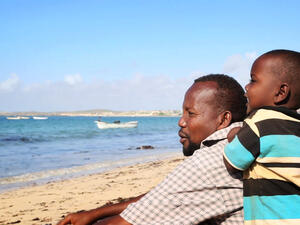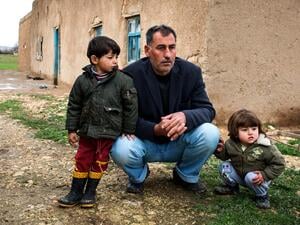Lubbers hails return movements in West Africa
Lubbers hails return movements in West Africa

High Commissioner Ruud Lubbers with Resident Minister Sahr Randolph Fillie-Faboi (left) and UNHCR's Ibrahima Coly at the Sierra Leonean border town of Gendema.
GENDEMA, Sierra Leone, Feb 3 (UNHCR) - UN refugee agency chief Ruud Lubbers has joined a convoy of Liberian refugees returning home from Sierra Leone, just months after the completion of a repatriation movement in the opposite direction.
On Wednesday, Lubbers bade farewell to 17 trucks carrying 205 Liberian refugees across the Mano river bridge, the natural boundary between Sierra Leone and Liberia.
"We are here today to celebrate another repatriation," said the High Commissioner at the Sierra Leonean border town of Gendema, at the crossroads of two of the biggest repatriation movements in West Africa.
He was referring to the ongoing facilitated repatriation of Liberian refugees from Sierra Leone that started last October and has so far brought more than 2,100 Liberian refugees home. He was also pointing to the organised repatriation of Sierra Leonean refugees that started in 2000 and ended last July, bringing home some 280,000 refugees, 178,000 of them with UNHCR assistance.
Lubbers expressed gratitude to the government and people of Sierra Leone for hosting Liberian refugees who, he said, now have the opportunity to return home with improved security in Liberia.
In Gendema, hundreds of people including staff from UNHCR and partners agencies, government officials and locals gathered to welcome the High Commissioner on Wednesday. There was singing and dancing by Sierra Leoneans, many of whom had benefited from UNHCR protection.
Lubbers said that after years of difficulties, it is a miracle that there is now peace in Sierra Leone. "There was a rough moment here, but the time has come to speak of violence as something of the past," he said. "I can see that you are really prepared to live in peace and harmony."
He stressed that peace starts at home, in the family and community, and encouraged the education of girls in particular.
The Resident Minister, Sahr Randolph Fillie-Faboi, said that UNHCR's community empowerment projects have made a big difference to the lives of Sierra Leoneans. He assured Lubbers of his government's continued assistance in hosting Liberian refugees, and appealed for the rehabilitation of the Kailahun and Zimmi roads that lead to the Liberian border, noting that this would ease repatriation.
Wednesday's visit to the border marked the end of the High Commissioner's visit to Sierra Leone. During his two-day mission, he met with President Ahmad Tejan Kabbah; the UN Special Representative to Sierra Leone, Daudi Mwakawago; the Deputy Commissioner for the National Commissioner for Social Action, Justin Bangura; and other actors in humanitarian and development work. In all the meetings, Lubbers discussed peace and security issues in addition to UNHCR's 4Rs strategy of repatriation, reintegration, reconstruction and resettlement.
Addressing the press on Tuesday, Lubbers noted that some progress has been made over the years but reiterated that Sierra Leone has a long way to go and still needs support. The West African country has been ranked as the least developed nation in the world by the United Nations Human Development Index Report for the fourth time in a row.
By Sulaiman Momodu
UNHCR Sierra Leone









